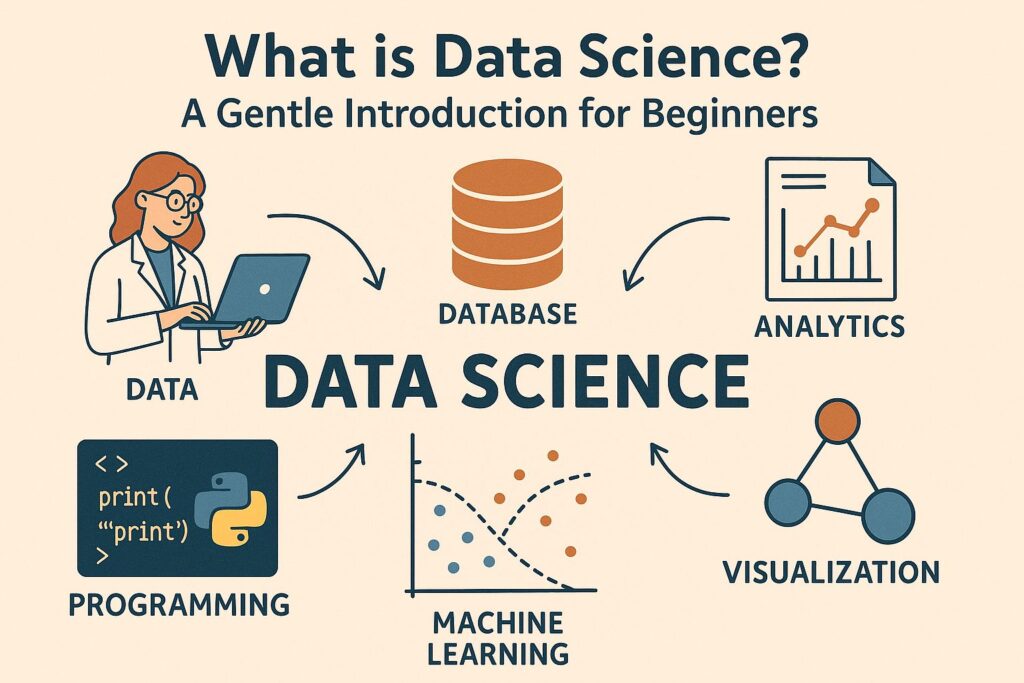Ever wondered how Netflix knows exactly what shows you’ll love next? Or how Google Maps finds the fastest route through traffic? The answer, more often than not, involves something called Data Science.
It sounds complex, doesn’t it? Like something only super-smart statisticians or computer wizards can understand. But at its heart, Data Science is simply about using data to understand the world better and make smarter decisions. Think of it as being a detective, but instead of looking for clues at a crime scene, you’re looking for patterns and insights hidden within vast amounts of information.
In today’s world, we’re surrounded by data – from our social media scrolls to our online purchases, weather patterns, and even how long we spend watching a video. Data science is the field that helps us make sense of all this information.
What Exactly IS Data Science?
Let’s break down the data science definition in the simplest terms.
Data Science is an interdisciplinary field that uses scientific methods, processes, algorithms, and systems to extract knowledge and insights from structured and unstructured data.
Okay, that’s the formal definition. Let’s use an analogy. Imagine you run a small coffee shop. You collect data every day: how many lattes you sell, what time people come in, what the weather is like, which barista is working, and customer feedback.
A data scientist would look at all this “coffee shop data” to answer questions like:
- When should we order more milk?
- Are people buying more cold brew on hot days?
- Does offering a loyalty card increase repeat visits?
- Which marketing campaign brought in the most new customers?
By analyzing this data, you can make better decisions – maybe staff more baristas during peak hours you identified, or run a specific promotion on rainy days if you found that trend. That’s how data science works in a nutshell: collecting data, analyzing it, and using the findings to take action.
Why is Data Science Important?
In the digital age, companies and organizations collect massive amounts of data. This “big data” holds incredible potential, but only if you can understand it. Introduction to data science is crucial because it provides the tools and techniques needed to unlock that potential.
It helps businesses:
- Understand their customers better
- Improve operations
- Develop new products and services
- Make predictions (like sales forecasts or market trends)
- Detect fraud and security threats
- Optimize marketing efforts
Beyond business, data science is used in healthcare to predict disease outbreaks, in environmental science to model climate change, in sports to analyze player performance, and in research to make new discoveries. It’s a field that’s transforming almost every industry.
Key Components of Data Science (Simplified)
Data science isn’t just one thing; it’s a combination of different skills and activities. For data science for beginners, it helps to think of a few core areas:
- Collecting and Cleaning Data: Data rarely comes in a perfect, ready-to-use format. A big part of data science involves gathering data from various sources and cleaning it up – fixing errors, handling missing values, and getting it into a usable structure. Think of it like organizing messy files before you can read them.
- Analyzing Data: This is where you dig into the data to find patterns, trends, and relationships. Data analysis involves using statistical methods and tools to summarize data and identify insights.
- Machine Learning: This is a popular part of data science. Machine learning explained simply is teaching computers to learn from data without being explicitly programmed for every single task. For example, training a spam filter by showing it thousands of spam and non-spam emails. The computer learns to identify spam on its own.
- Data Visualization: Once you’ve analyzed data, you need to communicate your findings. Data visualization basics involve creating charts, graphs, and dashboards to present complex data in a way that’s easy for anyone to understand. A picture is often worth a thousand data points!
The Data Science Workflow (A Simple Look)
While projects vary, a typical data science process might look something like this:
- Ask a Question: What problem are we trying to solve? What do we want to learn from the data?
- Gather Data: Collect relevant data from various sources.
- Clean and Prepare Data: Make the data usable and organized.
- Explore and Analyze Data: Look for patterns, calculate statistics, and visualize the data.
- Model (Optional, often involves Machine Learning): Build a model to predict outcomes or classify data.
- Communicate Results: Share findings with others, often using visualizations.
- Deploy and Act: Put the insights or model into action and monitor the results.
Where Do We See Data Science? (Examples)
You encounter data science examples every day:
- Recommendation Systems: When Netflix suggests your next binge-watch, Spotify recommends a song, or Amazon shows you “customers who bought this also bought…”, that’s data science at work, analyzing your past behavior and preferences.
- Fraud Detection: Banks use data science to spot unusual transactions that might be fraudulent.
- Healthcare: Analyzing patient data to predict risks, diagnose diseases earlier, or personalize treatment plans.
- Targeted Advertising: Showing you ads online that are relevant to your interests based on your browsing history.
- Self-Driving Cars: Using data from sensors to make real-time decisions about navigation and safety.
Is Data Science for You?
If you’re curious, enjoy problem-solving, and like the idea of using data to uncover insights, then data science might be a field for you to explore! It combines elements of computer science, statistics, and domain expertise (understanding the area you’re working in, like marketing or healthcare).
Conclusion
What is data science? It’s a dynamic and exciting field that’s all about using the power of data to gain insights and make better decisions. It’s not just for experts; with the right resources and curiosity, beginners can absolutely start to understand its core concepts and explore its vast potential.
Whether you’re interested in tech, business, healthcare, or almost any other area, understanding the basics of data science will give you a valuable perspective in our increasingly data-driven world.



